#pyqt course
Explore tagged Tumblr posts
Text
Best Python Course in Jalandhar
Join the Best Python Course in Jalandhar by TechCadd! Master Python with industry-focused training and real-world projects.
Enroll now!
https://techcadd.com/best-python-course-in-jalandhar.php
#learn python#python online#python classes#python online practice#learn python language#object oriented programming python#python oop#python data class#python object oriented#computer language python#network programming in python#pyqt course#class class python#object oriented programming using python#python class class#python for network
0 notes
Text
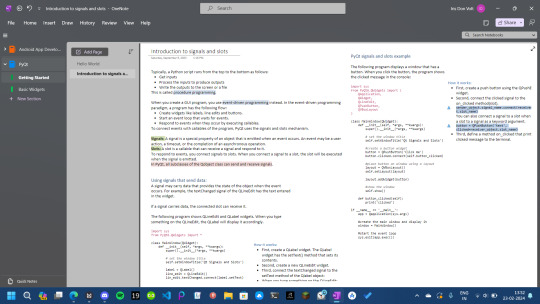
Feburary 23, 2024 • Friday
I revised a little bit of my PyQt notes, hoping to make more progress tomorrow.
I've decided to just look up free courses out of my knowledge base on the internet and read them like encyclopaedias like I used to in my childhood with actual encyclopaedias lol. I love acquiring knowledge.
I unearthed a premade planner that I got as a gift for my 17th birthday, covered in fungus (eek) so I had to fix that. I used it to plan my daily things and its a lot easier to have it on paper rather than trying to remember it all.
Hoping for more productivity tomorrow :)
🎧 So it goes — Taylor Swift

#dailyfoxposts#studyblr#codeblr#productivity#studyspo#study#note taking#coding#compblr#python#pyqt#pyqt6#onenote#studying#study motivation#life blogging#life#uni life#exam season
21 notes
·
View notes
Text
Zero to Hero in Python GUI Development: Build Interactive Applications
Master Python GUI development with this in-depth course. Learn how to create interactive desktop applications using libraries like Tkinter and PyQt. This course takes you from basics to advanced, helping you build user-friendly applications from scratch. Perfect for anyone eager to dive into GUI programming with Python!
0 notes
Text

Python training in developing GUI applications equips you with the skills to create interactive and user-friendly interfaces. By mastering libraries like Tkinter, PyQt, and Kivy, you can design and implement desktop applications with ease. This training covers essential concepts, best practices, and hands-on projects, ensuring you can build professional-grade GUIs to enhance user experience.
For more information visit: https://www.webagesolutions.com/courses/python-training
0 notes
Text
An Extensive Guide to Python Programming's Flexible Universe
In the coding world, Python distinguishes itself through its simplicity, flexibility, and clean syntax. Its widespread utilization across varied industries confirms its importance and efficiency. Python supports a wide array of applications, from web development and data analysis to automation and game development, making it indispensable for programmers and developers globally. This detailed guide explores Python's extensive features, highlighting its practical uses, essential tools, and relevance across different fields. For those aiming to boost their programming prowess, taking a Python course in Hyderabad provides a thorough foundation, offering deep insights and hands-on experience with this popular programming language.
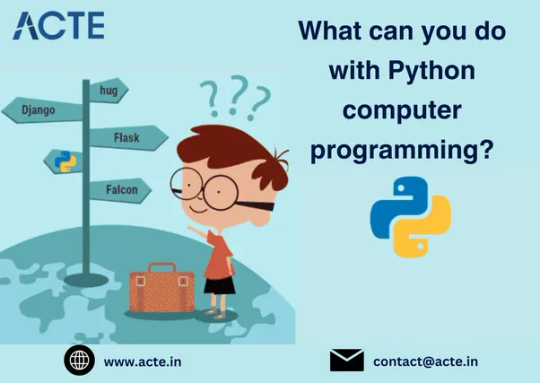
Python in Web Development:
Python demonstrates significant strengths in web development through frameworks like Django and Flask. Django is renowned for its ability to facilitate rapid development and its clean, efficient design, ideal for complex website projects. Conversely, Flask is known for its simplicity and flexibility, suited for less complex web tasks.
Python's Impact on Data Science:
Python leads in data science with its vast array of libraries geared toward data manipulation, statistical analysis, and machine learning. Utilizing tools such as Pandas and NumPy allows data scientists to efficiently handle and analyze substantial data sets, extract deep insights, and conduct complicated statistical operations. The integration of Python with leading machine learning libraries like Scikit-learn and TensorFlow further bolsters its capacity to craft advanced predictive models, making it a pivotal element in data-centric initiatives.
Python for Automating Tasks:
Python excels in automating mundane activities throughout various domains, including data organization, web scraping, and system administration. Its straightforward syntax combined with a robust standard library enables developers to devise efficient scripts that simplify complex operations and reduce hands-on work.
Game Development Using Python:
Python extends its versatility to game development, supported by libraries such as Pygame, which provides necessary tools for developers to create engaging and interactive gaming experiences. Its approachable syntax and wide-ranging library options make it suitable for game developers at all expertise levels.
Scripting with Python:
The simplicity and adaptability of Python also shine in scripting, optimizing routine tasks, enhancing existing software functionalities, or crafting bespoke tools. Python's expressive programming and extensive library support fulfill diverse scripting needs effectively. To truly understand Python’s scripting prowess, enrolling in an online Python course can be very beneficial, blending expert guidance with practical projects.
Python for Desktop GUI Applications:
Python also extends beyond web and software development to creating desktop applications using libraries like Tkinter and PyQt. These enable developers to produce cross-platform desktop applications with graphical interfaces, providing user-friendly solutions for business, personal, or educational applications.
Python in the Internet of Things (IoT):
Python is apt for programming IoT devices and managing sensor data, thanks to its lightweight and adaptable nature. Its straightforward approach and substantial library support equip developers with the essential tools to efficiently develop and launch potent IoT solutions.
Web Scraping Using Python:
Python facilitates effective web scraping with libraries like BeautifulSoup and Scrapy, designed for easy extraction and manipulation of web data. These tools help in parsing HTML documents and collecting data for further processing or analysis
Scientific Computing with Python:
Python ventures into scientific computing with libraries such as SciPy and SymPy, providing sophisticated tools for numerical computation, optimization, and algebraic solutions. These capabilities are invaluable to scientists and researchers for conducting complex simulations, analyses, and addressing mathematical challenges.
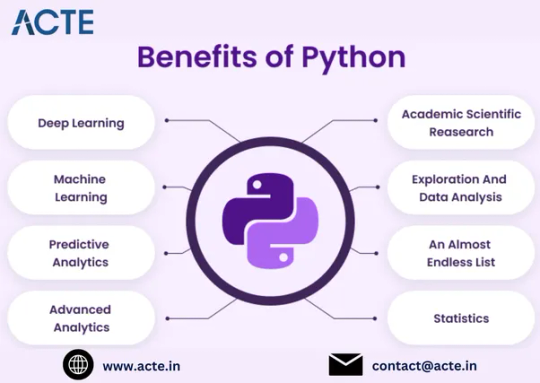
The Educational Significance of Python:
With its clear, legible syntax and well-documented nature, Python is an excellent entry point into programming. Its gentle learning curve and diverse applicational scope make it a top choice for newcomers to programming and computational sciences, enhancing their analytical and problem-solving abilities.
Backend Development with Python:
Python’s adaptability also shines in backend development, powering web servers and APIs across various sectors. Its easy-to-understand code, scalability, and extensive frameworks and libraries make it the preferred option for building sturdy, adaptable backend architectures capable of handling intricate data tasks and business logic.
Python in DevOps:
Python is indispensable in the DevOps arena, automating infrastructure tasks, system configurations, and software deployments. Its legible syntax and comprehensive standard library make it an ideal tool for scripting and creating applications that boost the efficiency and dependability of software development and operational procedures.
Conclusion:
Python’s multifunctional nature and wide scope make it a standout choice for developers and programmers across diverse sectors. Spanning web and software development, data analysis, automation, and more, Python offers a vast array of tools and libraries for creating detailed and innovative solutions. Engaging with Python programming unlocks endless possibilities, fostering creativity, innovation, and success in the constantly advancing realm of technology and development.
#python course#python#coding#programming#software development#web development#mobile app development#game development
0 notes
Text
Python in Action: From Data Analysis to Game Development
Welcome to the realm of Python programming, a journey filled with endless possibilities and opportunities for innovation. Python stands as a beacon of versatility in the world of software development, offering a wealth of tools and libraries to tackle a myriad of challenges across diverse domains.
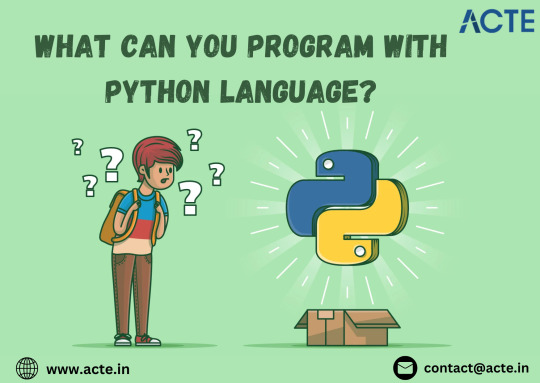
In this comprehensive exploration, we will embark on a journey to uncover the multifaceted nature of Python, delving into its applications in web development, data analysis, automation, artificial intelligence, game development, desktop applications, and the Internet of Things (IoT). Join us as we unravel the boundless potential of Learn Python Course in Hyderabad and discover how it continues to shape the landscape of modern technology.
Empowering Web Development: Unleashing the Potential of Django and Flask
Python's influence in web development is undeniable, thanks to robust frameworks like Django and Flask. These frameworks empower developers to build dynamic and scalable web applications with ease. From content management systems to e-commerce platforms, Python's versatility shines through, providing developers with the tools needed to create responsive and feature-rich websites.
Data Analysis and Visualization: Navigating Insights with Python's Data Science Capabilities
Python's rich ecosystem of data analysis and visualization libraries makes it a powerhouse in the realm of data science. With libraries like Pandas, NumPy, and Matplotlib, developers can efficiently manipulate, analyze, and visualize data, uncovering valuable insights that drive decision-making across industries. Python's flexibility and simplicity make it a preferred choice for data scientists and analysts seeking to extract meaningful information from complex datasets.
Automation: Streamlining Workflows with Python's Scripting Capabilities
Python's scripting capabilities make it an indispensable tool for automating repetitive tasks and workflows. Whether it's web scraping, file management, or system administration, Python scripts can streamline processes and increase productivity. With libraries like Requests and BeautifulSoup, developers can automate web scraping tasks, extracting data from websites with ease. Similarly, Python's os and shutil modules provide powerful tools for file management and system administration, enabling developers to automate tasks efficiently.
Artificial Intelligence and Machine Learning: Pioneering Innovation with Python's AI Capabilities
Python has emerged as a frontrunner in artificial intelligence and machine learning, thanks to libraries like TensorFlow, PyTorch, and Scikit-learn. These libraries provide developers with the tools needed to build and deploy machine learning models for a wide range of applications. From image recognition to natural language processing, Python's AI capabilities are driving innovation and reshaping industries across the globe.
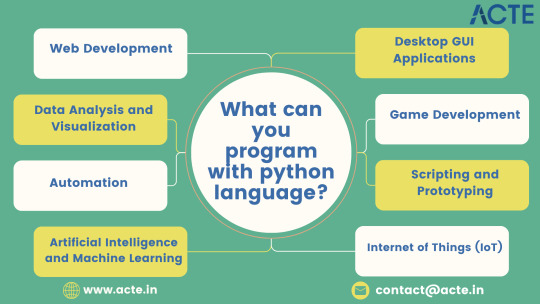
Desktop GUI Applications: Crafting Intuitive Interfaces with Python's GUI Frameworks
Best Python Certification Online offers a variety of GUI frameworks, including Tkinter, PyQt, and wxPython, for building desktop applications with graphical user interfaces. These frameworks provide developers with the tools needed to create intuitive and interactive user interfaces, making it easy to develop desktop software for various purposes. Whether it's business applications or multimedia tools, Python's GUI frameworks empower developers to create polished and user-friendly desktop applications.
Game Development: Breathing Life into Entertainment with Python and Pygame
Python, in conjunction with libraries like Pygame, offers a platform for developing 2D games and prototypes. While not as robust as some game engines, Python's simplicity and ease of use make it an attractive option for beginners and hobbyists exploring game development. With Pygame's features for handling graphics, sound, and input, developers can create engaging and immersive gaming experiences with Python.
Internet of Things (IoT): Connecting the World with Python's Lightweight Footprint
Python's lightweight footprint and versatility make it an ideal choice for IoT applications. Whether it's programming embedded systems or interacting with sensors and actuators, Python provides developers with the tools needed to build connected solutions. With libraries like MicroPython and CircuitPython, developers can program microcontrollers and single-board computers, enabling them to create innovative IoT projects and solutions.
Conclusion: Embracing Python's Versatility for Innovation
In conclusion, Python's versatility and capabilities make it a valuable asset for developers across a wide range of domains. Whether it's web development, data analysis, automation, artificial intelligence, game development, desktop applications, or IoT, Python offers boundless opportunities for innovation and creativity. Its simplicity, readability, and extensive ecosystem of libraries make it accessible to developers of all levels, empowering them to bring their ideas to life and drive technological advancements. So, whether you're a seasoned developer or just starting out, embrace Python's versatility and embark on a journey of endless possibilities in the world of technology.
0 notes
Text
Intermediate level Python projects for assignments could include tasks like building a web scraper to extract data from websites, creating a simple database management system, developing a basic text-based game or chatbot, implementing algorithms like sorting or searching, or crafting a GUI application using libraries like Tkinter or PyQt.
0 notes
Text
it course in chennai
Yes, mobile apps can be developed using Python. Python offers several frameworks and libraries that enable developers to create mobile applications for various platforms, including iOS and Android. Some of the popular options for mobile app development in Python include:
Kivy: Kivy is an open-source Python library for developing multi-touch applications. It is cross-platform and can be used to create mobile apps for Android, iOS, Windows, Linux, and macOS.
BeeWare: BeeWare is a collection of tools and libraries that allow you to write native apps for multiple platforms, including mobile (iOS and Android), desktop, and web using Python.
PyQt and PySide: These Python bindings for the Qt framework allow you to create cross-platform mobile apps, along with desktop applications. While they are more commonly used for desktop applications, they can also be used for mobile app development.
SL4A (Scripting Layer for Android): SL4A is an open-source project that provides a simplified way to create Android apps using various scripting languages, including Python. You can use SL4A to develop Android apps with Python scripting.
Pyjnius and PyObjus: These are Python libraries that allow you to access native Android and iOS APIs from Python, making it easier to develop mobile apps with a native look and feel.
Django and Flask: While Django and Flask are web frameworks, you can use them to build web-based mobile applications using HTML, CSS, and JavaScript. These apps can be accessed through a mobile web browser.
It's important to note that while Python can be used for mobile app development, there are some limitations and trade-offs compared to using languages like Swift for iOS and Java or Kotlin for Android, especially in terms of performance and access to platform-specific features. However, Python can be a good choice if you are already familiar with the language and want to create a cross-platform app or if your app's requirements do not demand high-performance native code.

it course in Chennai, it institute in Chennai, it training center in Chennai, best it courses in Chennai, software courses in Chennai, software training institutes in Chennai
0 notes
Link
3 notes
·
View notes
Photo
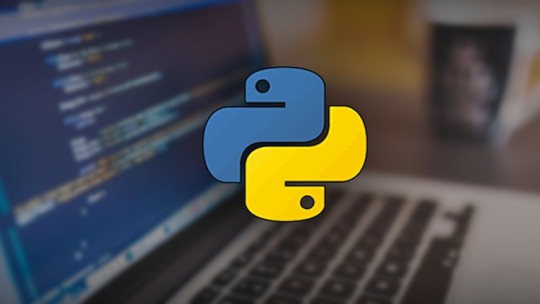
Python Programming Full Course (Basics,OOP,Modules,PyQt) ☞ http://bit.ly/2rXlDJr #python #programming
2 notes
·
View notes
Text
PYTHON IN THE REAL WORLD TODAY
Top organizations like YouTube, DropBox, Google, Quora and even Netflix use Python. Likewise, Python is the second most utilized language on the planet according to Github. There are numerous different reasons that I can give you on for what reason should you realize Python.
The following are the a few applications where Python is generally utilized:
1. Web and Internet Development
Python gives you a chance to build up a web application absent much inconvenience. It has libraries for web conventions like HTML and XML, JSON, email preparing, IMAP, FTP and simple to-utilize attachment interface. The bundle list have more libraries:
· Solicitations – A HTTP customer library
· BeautifulSoup – A HTML parser
· Feedparser – For parsing RSS/Atom channels
· Paramiko – For actualizing the SSH2 convention
· Curved Python – For nonconcurrent organize programming
Python likewise have an extent of structures accessible. Some of them are-Django, Pyramid. We additionally get microframeworks like flagon and jug. You will discover this review on an Introduction to Python Programming.
We can likewise compose CGI contents, and we get propelled substance the board frameworks like Plone and Django CMS.
2. Work area GUI Applications
Most twofold appropriations of Python send with Tk, a standard GUI lib. It gives you a chance to draft a UI for applications. Aside from that, some toolboxs thR are accessible are:
· wxWidgets
· Kivy – for composing multitouch applications
· Qt by means of pyqt or pyside
· We likewise have some stage explicit toolboxs:
· GTK+
· Microsoft Foundation Classes through the win32 augmentations
· Delphi
3. Logical and Numeric Applications
It is anything but an unexpected that python discovers its place in established researchers. For this, we have:
· SciPy – An accumulation of bundles for arithmetic, science, and designing.
· Pandas - An Data investigation and - displaying library
· IPython – An incredible shell for simple altering and recording of work sessions. It likewise bolsters perceptions and parallel processing.
· Programming Carpentry Course – It shows essential abilities for logical figuring and running bootcamps. It likewise gives open-get to educating materials.
Additionally, NumPy gives us a chance to manage complex numerical counts.
4. Programming Development Application
Programming engineers use python as a help language. They use it to construct control and the executives, testing, and for some different things:
· SCons – for manufacture control
· Buildbot, Apache Gump – for computerized and nonstop assemblage and testing
· Gathering, Trac – for undertaking the board and bug-following.
· List of Integrated Development Environments
5. Python Applications in Education
On account of its effortlessness, quickness, and substantial network, Python makes for a marvelous early on programming language. It's an extraordinary language to educate in schools or even learn alone.
Pursue my record to peruse my standard answers on Data Science

6. Python Applications in Business
Python is additionally an extraordinary decision for creating ERP and internet business frameworks:
· Tryton – A three-level, abnormal state broadly useful application stage.
· Odoo – An administration programming with a scope of business applications. With all that, it's an all-rounder and structures a total suite of big business the board applications basically.
7. Database Access
With Python, you have:
· Custom and ODBC interfaces to MySQL, Oracle, PostgreSQL, MS SQL Server, and others. These are unreservedly accessible for download.
· Article databases like Durus and ZODB
· Standard Database API
8. System Programming
With each one of those potential outcomes, how might Python slack in system programming? It provides support for lower-level system programming:
· Contorted Python – A system for offbeat system programming. We referenced it in area 2.
· A simple to-utilize attachment interface
9. Diversions and 3D Graphics
This one is the most intriguing. When individuals hear somebody state they're learning Python, the principal thing they get asked is – 'All in all, did you make any diversion yet?'
PyGame, PyKyra are two structures for amusement advancement with Python. Aside from these, we additionally get an assortment of 3D-rendering libraries.
In case you're one of those diversion engineers, you can look at PyWeek, a semi-yearly amusement programming challenge.
10. Other Python Applications
These are a portion of the significant Python use cases. Aside from what we just talked about, regardless it discovers use in more places:
· Support based Applications
· Sound – or Video-based Applications
· Applications for Images
· Endeavor Applications
· 3D CAD Applications
· PC Vision (Facilities like face-discovery and shading location)
· Computer Vision
· Machine learning
· Web Scraping (Harvesting Data from sites)
· Scripting
· Artificial intelligence
· Data Analysis
Python is simply all over.
2 notes
·
View notes
Text
Top 10 Python GUI Frameworks for Developers
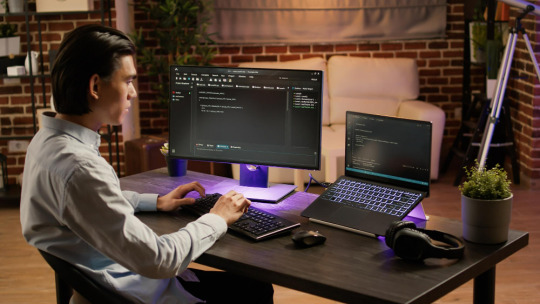
Python is a powerful and versatile programming language used by developers to build a wide range of applications. From web applications to data analysis and machine learning, Python has become the go-to language for developers in various domains. Graphical user interfaces (GUIs) are an essential part of many applications, making it easier for users to interact with software. In this article, we will discuss the top 10 Python GUI frameworks that developers can use to create amazing graphical user interfaces.
PyQt
PyQt is a cross-platform GUI toolkit that is built around the popular Qt framework. It is one of the most widely used Python GUI frameworks and offers a range of tools and widgets for building desktop applications. PyQt is compatible with multiple platforms including Windows, Mac OS X, and Linux, and provides a consistent look and feel across all these platforms.
Tkinter
Tkinter is the default GUI framework that comes with Python. It is a powerful toolkit for creating desktop applications and provides a range of widgets such as buttons, labels, and menus. Tkinter is easy to learn and use and is suitable for beginners and experienced developers alike.
wxPython
wxPython is a popular GUI framework that is based on the C++ wxWidgets library. It offers a range of tools and widgets for building cross-platform desktop applications. wxPython provides a native look and feel for each platform and supports many popular GUI development tools. If you're looking for training in python, then you can check out our Python course in Bangalore.
PySide
PySide is an open-source Python GUI framework that is based on the Qt framework. It offers a range of tools and widgets for building desktop applications and provides a native look and feel across multiple platforms. PySide is easy to use and offers excellent performance.
Kivy
Kivy is an open-source Python GUI framework that is designed for creating multi-touch applications. It provides a range of tools and widgets for building cross-platform mobile and desktop applications. Kivy is easy to learn and use and is suitable for beginners and experienced developers alike. If you're looking for training in react native, then you can check out our react native course in Bangalore.
PyGTK
PyGTK is a Python binding for the GTK+ toolkit, which is a popular GUI toolkit used in many Linux applications. It provides a range of tools and widgets for building desktop applications and is compatible with multiple platforms including Windows and Mac OS X.
Pyforms
Pyforms is an open-source Python GUI framework that is designed for creating complex desktop applications. It provides a range of tools and widgets for building cross-platform applications with an intuitive and modern user interface. Pyforms is easy to learn and use and offers excellent performance.
PyGUI
PyGUI is an open-source Python GUI framework that is designed for creating small to medium-sized desktop applications. It provides a range of tools and widgets for building cross-platform applications with a modern user interface. PyGUI is easy to learn and use and offers excellent performance.
PyGObject
PyGObject is a Python binding for the GObject library, which is the foundation of the GNOME desktop environment. It provides a range of tools and widgets for building desktop applications with a modern user interface. PyGObject is compatible with multiple platforms including Windows and Mac OS X.
PyQTgraph
PyQtgraph is an open-source Python GUI framework that is designed for creating scientific and technical applications. It provides a range of tools and widgets for building cross-platform applications with a modern user interface. PyQtgraph is easy to learn and use and offers excellent performance.
Conclusion
Python offers a wide range of GUI frameworks for developers to build amazing graphical user interfaces. Each framework has its own set of advantages and disadvantages, and the choice depends on the specific requirements of the application. PyQt, Tkinter, wxPython, PySide, Kivy, PyGTK, Pyforms, PyGUI, PyGObject, and PyQtgraph are the top 10 Python GUI frameworks
0 notes
Text
Power Up Your Python Skills: 10 Exciting Projects to Master Coding
Forget textbooks and lectures – the most epic way to learn Python is by doing! This guide unveils 10 thrilling projects that will transform you from a programming rookie to a coding champion. Prepare to conquer these quests and unleash your creativity and problem-solving prowess.
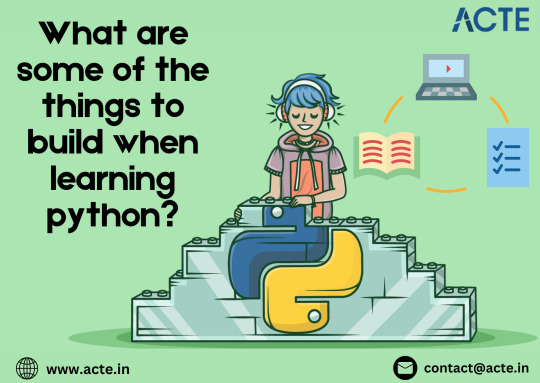
With the helpful assistance of Learn Python Course in Hyderabad, studying Python becomes lot more exciting — regardless of whether you’re a beginner or moving from another programming language.
Mission 1: Command Line Masters
Your quest begins with mastering the fundamentals. Build simple command-line applications – think math wizards, unit converters, or random password generators. These projects are the stepping stones to Pythonic greatness!
Mission 2: Text-Based Games – Level Up
Time to challenge yourself! Create captivating text-based games like Hangman, Tic-Tac-Toe, or a trivia extravaganza. Craft engaging gameplay using loops, conditionals, and functions, while honing your Python skills in the process.
Mission 3: Web Scraper – Unearthing Web Data
The vast web holds secrets waiting to be discovered! Build web scrapers to extract valuable information from websites. Employ libraries like BeautifulSoup and Requests to navigate the HTML jungle, harvest data, and unlock hidden insights.
Mission 4: Data Analysis Detectives
Become a data analysis extraordinaire! Craft scripts to manipulate and analyze data from diverse sources – CSV files, spreadsheets, or databases. Calculate statistics, then use matplotlib or seaborn to create eye-catching data visualizations that reveal hidden truths.
Mission 5: GUI Gurus – Building User-Friendly Interfaces
Take your Python mastery to the next level by crafting user-friendly graphical interfaces (GUIs) with Tkinter or PyQt. From to-do list managers to weather apps, these projects will teach you how to design intuitive interfaces and conquer user interactions.
Mission 6: API Alliances – Connecting to the World
Expand your horizons by building clients for web APIs. Interact with services like Twitter, Reddit, or weather APIs to retrieve and display data. Master the art of making HTTP requests, parsing JSON responses, and handling authentication – invaluable skills for any programmer. People can better understand Python’s complexity and reach its full potential by enrolling in the Best Python Certification Online.
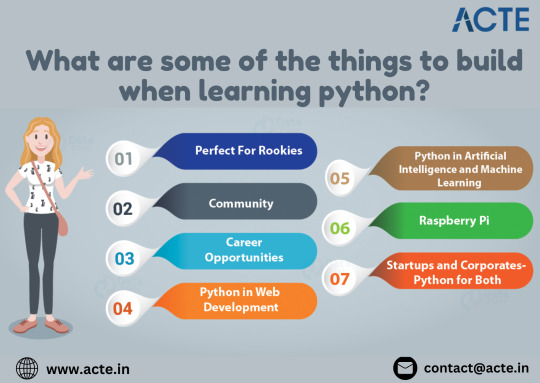
Mission 7: Automation Army – Streamlining Workflows
Say goodbye to repetitive tasks! Write automation scripts to handle tedious processes like file management, data processing, or email sending. Utilize libraries like os, shutil, and smtplib to free up your time and boost productivity.
Mission 8: Machine Learning Marvels – Unveiling AI Power
Enter the fascinating world of machine learning! Build basic classification or regression models using scikit-learn. Start with beginner-friendly projects like predicting housing prices or classifying flowers, then explore more complex algorithms as you progress.
Mission 9: Web Development Warriors – Forge Your Online Presence
Immerse yourself in the thrilling world of web development. Construct simple websites or web applications using frameworks like Flask or Django. Whether it's a personal portfolio site, a blog, or a data-driven application, these projects will teach you essential skills like routing, templating, and database interactions.
Mission 10: Open Source Odyssey – Join the Coding Community
Become a valued member of the open-source community! Contribute to projects on platforms like GitHub. Tackle beginner-friendly issues, fix bugs, or improve documentation. Gain real-world experience and collaborate with fellow developers to make a lasting impact.
These 10 Python quests aren't just about acquiring coding skills – they're a gateway to a world of exploration and innovation. Each project offers a unique opportunity to learn, grow, and create something amazing. So, grab your virtual sword and shield (aka your code editor) and embark on this epic Python adventure!
0 notes
Text
Python as programming language and its uses
Python is a versatile programming language with applications of wide ranges. Some of the popular uses of Python are: 1. Web Development - Python is used to build web applications, from basic static websites to complex dynamic web applications using frameworks like Django, Flask, Pyramid, and Bottle. 2. Data Science and Analytics - Python is widely used for data analysis, machine learning, and artificial intelligence. It has several libraries and frameworks such as Pandas, NumPy, Scikit-Learn, TensorFlow, and Keras, which help in data manipulation, visualization, and modeling. 3. Scientific Computing - Python is used extensively in scientific research and engineering applications. It has specialized libraries like SciPy, NumPy, and Matplotlib, which are used for scientific computing, numerical analysis, and data visualization. 4. Desktop GUI Applications - Python can be used to create desktop applications using frameworks like PyQt, PyGTK, and wxPython. These frameworks allow developers to create cross-platform graphical user interfaces for their applications. 5. Game Development - Python is also used for game development, with libraries like Pygame, PyOpenGL, and Pyglet. 6. Automation - Python can be used for automating repetitive tasks, such as web scraping, testing, and system administration. 7. Education - Python is used extensively in computer science education as it is easy to learn, has a simple syntax, and is versatile. It is also used in coding boot camps, online courses, and programming competitions. Overall, Python is a powerful and versatile programming language with many applications in various industries, from finance and healthcare to education and entertainment. Python is interpreted programming language of high level. Python's design philosophy emphasizes code readability through judicious use of sensible indentation. What are the uses of Python? 1. GENERAL WEB DEVELOPMENT / WEB APPLICATION BUILD - Python is one of the easiest programming languages and we mean it right. "Python, emphasizes code readability and allows the use of English keywords instead of punctuation marks .A clean and readable code base helps you maintain and update your software without wasting time or extra effort." 2. COMPUTER SCIENCE + DATA SCIENCE - Python is also used for scientific research and computer science and also has several scientific or science specific libraries including: Astropy for astronomy Biopython for biology and bioinformatics Graphic tool for statistical analysis of Graphs Psychops for Neuroscience and Experimental Psychology. 3.MACHINE LEARNING – Machine learning is an application of A.I.. Using Python for machine learning is pretty cool, so it seemed like one more line item to justify that. Machine learning encompasses financial services, speech recognition . 4.STARTUPS – This might seem like an odd entry on the list, but it's true: startups, and technology startups in particular, love Python because it's easy to use and scalable. And I mean scalable. Take Dropbox for example. 5. FINTECH + FINANCIAL INDUSTRY – In 2016, Hacker Rank published a survey of various industries showing which programming languages were their priority when hiring. Python-django Training and Placements by DOCC Kolkata. Apprenticeship and Internship. Call 9433526196 Visit www.dockkolkata.com Author: U Roy, DOCC Kolkata
0 notes
Text
How do I learn Python in depth?
Learn Python Online from scratch. Our Beginning Python course at the University of Bristol assumes no prior programming experience.
There's no shortcut, read lots of code then write lots of code.
Start and learn the basics: Python installation is the first step. Select Python 3.x, establish your coding environment, select the Python directory, etc.
Master libraries: Building components, such as libraries or modules, assist you in creating your app. Which one do you need for your app out of the thousands of modules available?Depending on the product you wish to create. Django or Flask are popular frameworks for web projects. Tensorflow and Sklearn are two prominent modules for machine learning. You can use wxwidgets, pyqt, tkinter, or other modules for desktop apps.
Study courses: Courses can help to boost your knowledge. There are many courses out there, that will give you a kick start in developing software applications. Instead of struggling through the documentation, why not follow short video tutorials that explain clearly?
Work on projects: Once you mastered the basics and can use modules, it's time to make your own apps!
0 notes
Photo

Python Programming Full Course (Basics,OOP,Modules,PyQt) ☞ http://on.learn4startup.com/B1wiBK8O7 #python
2 notes
·
View notes